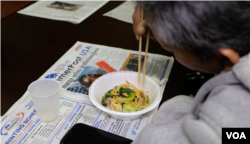The Massachusetts city of Lowell is home to the second-largest Cambodian community in the U.S., and the Khmer Post USA, a newspaper printed in English and Khmer, aims to keep them informed under a near-constant threat of closure.
The newspaper has a potential audience of 35,000 Cambodians in Lowell and the surrounding area. Many seem to use its pages as tablecloths or packing paper, but the biweekly’s co-founder and publisher, Soben Ung, 38, says this doesn’t upset her.
One of her goals for the publication is keeping the Khmer language alive in the immigrant community. As Cambodians born in the U.S. supplant those who arrived as refugees in the 1980s in the aftermath the murderous Khmer Rouge rule of 1975-79, the language is used by fewer people.
“When they spread it out to pack stuff, they see it, at least they read one or two words,” she told VOA Khmer during an interview. “It is a kind of exposure. As long as the paper reaches their hands, it serves some benefit. … Reading it is helping yourself, improving your knowledge.”
A mix of news
Soben Ung publishes 5,000 copies of the newspaper, which is distributed free and supported by ad revenue. The small staff includes journalists in Cambodia, and each issue offers readers a mix of news from Cambodia, local news related to Cambodians that isn’t covered by the mainstream press and features on Cambodian history.
The immigrant press has a long history in the United States. Benjamin Franklin published the first such newspaper, the German-language Philadelphische Zeitung in 1732. It failed about a year later because the German community rejected a publication by somebody who wasn’t German, according to notes for a 2014 exhibition in Washington.
The exhibition, curated by Sharon Shahid, who is now an editor at VOA, focused “on how America’s ethnic media not only kept their particular constituencies informed, but also propelled each group’s struggle for justice.” By linking their country of origin with their adopted country, immigrant media help newcomers by guiding them toward inclusion, said Shahid.
In Lowell, Cambodians' move toward inclusion is due in part to the city’s history of welcoming waves of immigrants since the 19th century because they were needed as workers in the storied textile mills that put the place on the map in the 1820s.
The Cambodian community has been active in civic affairs for years, and a Cambodian American, Sokhary Chau, who is now on the city council, was elected mayor in 2021. Soben Ung believes the Khmer Post USA has been key to the emergence of Cambodian engagement in the local political process.
“It made our community grow,” she told VOA Khmer. “We have a voice, we have power so that we have respect. We had a mayor who is Cambodian. We have state representatives who are Khmers, two of them. We have three city councilors.”
Began in Philadelphia
The Khmer Post USA editor-in-chief, Samkhon Pin, was president of the Khmer Journalist Association of Cambodia, formed in 1994, which pushed for a free press after decades of restrictions.
He said the paper began in 2005 to serve the Cambodian population of Philadelphia before moving to Lowell in 2010, which had a larger Cambodian community and more Cambodian-run businesses that could afford to buy the ads that support it.
Vladimir Batrim of the Lowell Primary Care Center has advertised in the Khmer Post USA since 2017, when he opened the center.
More than 95% of the center’s 4,000 users are Cambodian Americans, he said, and his thinking was, “As we work for the Cambodian community, why not support another Cambodian-run business, which is the newspaper? … That is a kind of mutual support. I support their business because they are working for the same community.”
Other local businesses and government agencies bought ads because they viewed the Khmer Post USA as an effective channel for getting information to the Cambodian community on topics such as local schools, social services or elections.
But the newspaper battles for survival.
Some Cambodians, like Sovanna Oung, 61. who fled to the U.S. in 1983 and now repairs houses and delivers fish, say they’re too busy to read the paper regularly. The target audience is diminished by elders who find reading taxing on the eyes and by younger people who cannot read Khmer.
Soben Ung vows to keep publishing the newspaper as long as possible. “If I don’t run it, who will?” she said.
“I hope that it lives for a long time,” said Samkhon Pin.
Sovanna Oung added, “If it has to close, I’ll be sorry.”






